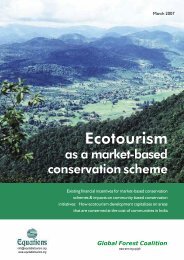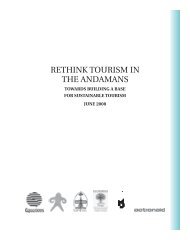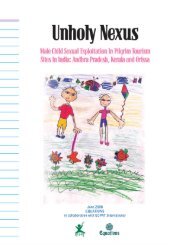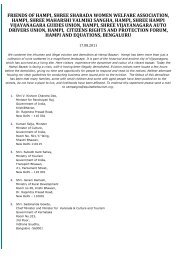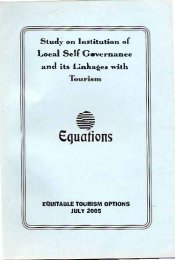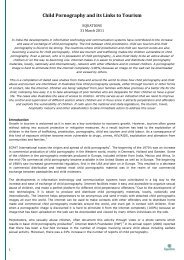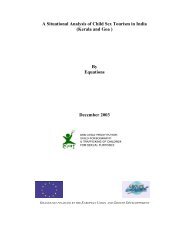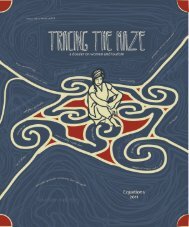Nilgiris Biosphere Reserve - Equitable Tourism Options
Nilgiris Biosphere Reserve - Equitable Tourism Options
Nilgiris Biosphere Reserve - Equitable Tourism Options
You also want an ePaper? Increase the reach of your titles
YUMPU automatically turns print PDFs into web optimized ePapers that Google loves.
not be renovated. A total ban on collection of minor forest produce such as<br />
tubers, mushrooms and wild vegetables was imposed. Adivasis were not<br />
allowed entry to the sacred sites and burial grounds within the forests. The<br />
government even sought to put a ban on traditional music and dance forms.<br />
The adivasis were constantly harassed. Several adivasi women were<br />
molested. Many were put behind bars on fake charges offorest offences.<br />
The indigenous people had to suffer all this while several non-adivasi<br />
encroachers were allowed to remain within the forests and cultivate nearly<br />
660 ha of forestlands on payment of yearly taxes. Many among them<br />
managed to get title deeds for nearly 100 ha offorest land<br />
Eco-tourism and the World Bank's Eco-development project<br />
The worst of such preference shown to the non-adivasis and the rich<br />
pleasure-seeking people at the cost of the indigenous people came about<br />
when the Government in 1994 entered into a lease agreement with Taj<br />
Group of hotels and a little later when the World Bank supported ecodevelopment<br />
project was proposed to be started in Nagarhole. The lease<br />
agreement with the Taj group, one of the riches business groups in India,<br />
was to lease 10 ha of forestland at Murkal in Nagarhole to build and operate<br />
a three-star tourist resort. The agreement was in total violation ofthe Forest<br />
Conservation Act and the Wild Life Protection Act. The agreement was also<br />
a contradiction of all tall claims of protecting the ecological balance and the<br />
biodiversity in the National Park.<br />
Similarly, the eco-development project negated the World Bank's own<br />
norms of "not carrying out any involuntary resettlement of people, n not<br />
eroding the "customary tenure rights over land and other assets of tribals<br />
living in the Protected Areas" ensuring "prior informed consent and<br />
participation" and "compensating the people relocated". Nevertheless, with<br />
the Rs. 295-crore (1 crore is 10 million) eco-development project promiSing<br />
a huge bounty, the Government intensified the pressure to evict the<br />
remaining Indigenous People from the Nagarhole forests. The project<br />
intended to wean away the adivasis from the forests by nominally "training"<br />
them in subsistence occupations such as pig rearing. This enterprise will be<br />
shown to be viable by pumping in massive subsidies. With this the<br />
indigenous people could be resettled outside the forests. The World Bank<br />
would have its hands clean. The plan ofthe Taj group was also interesting.<br />
73 Nilagiris : Fading Glory



